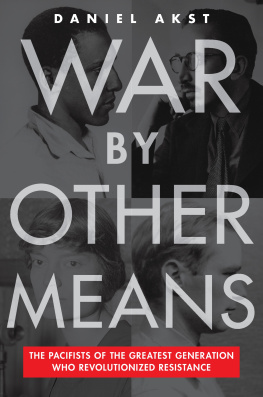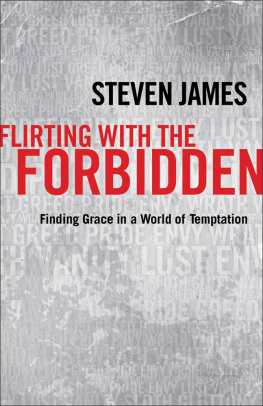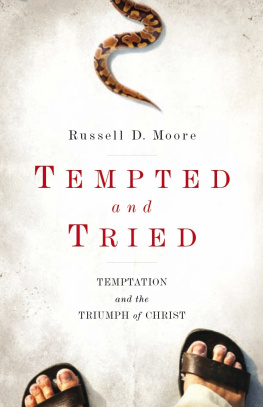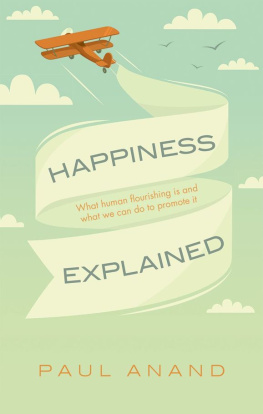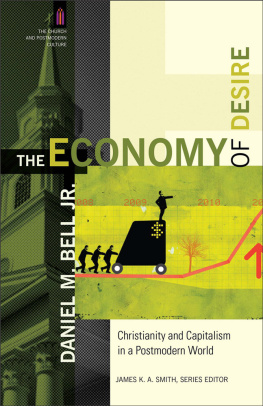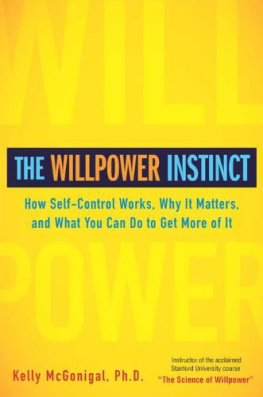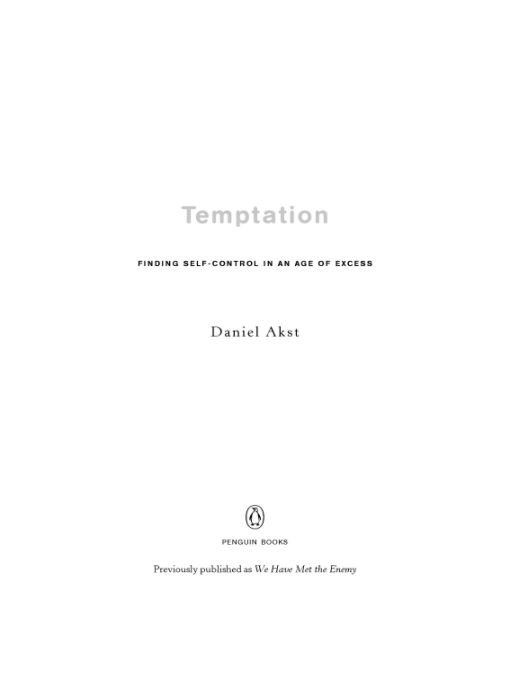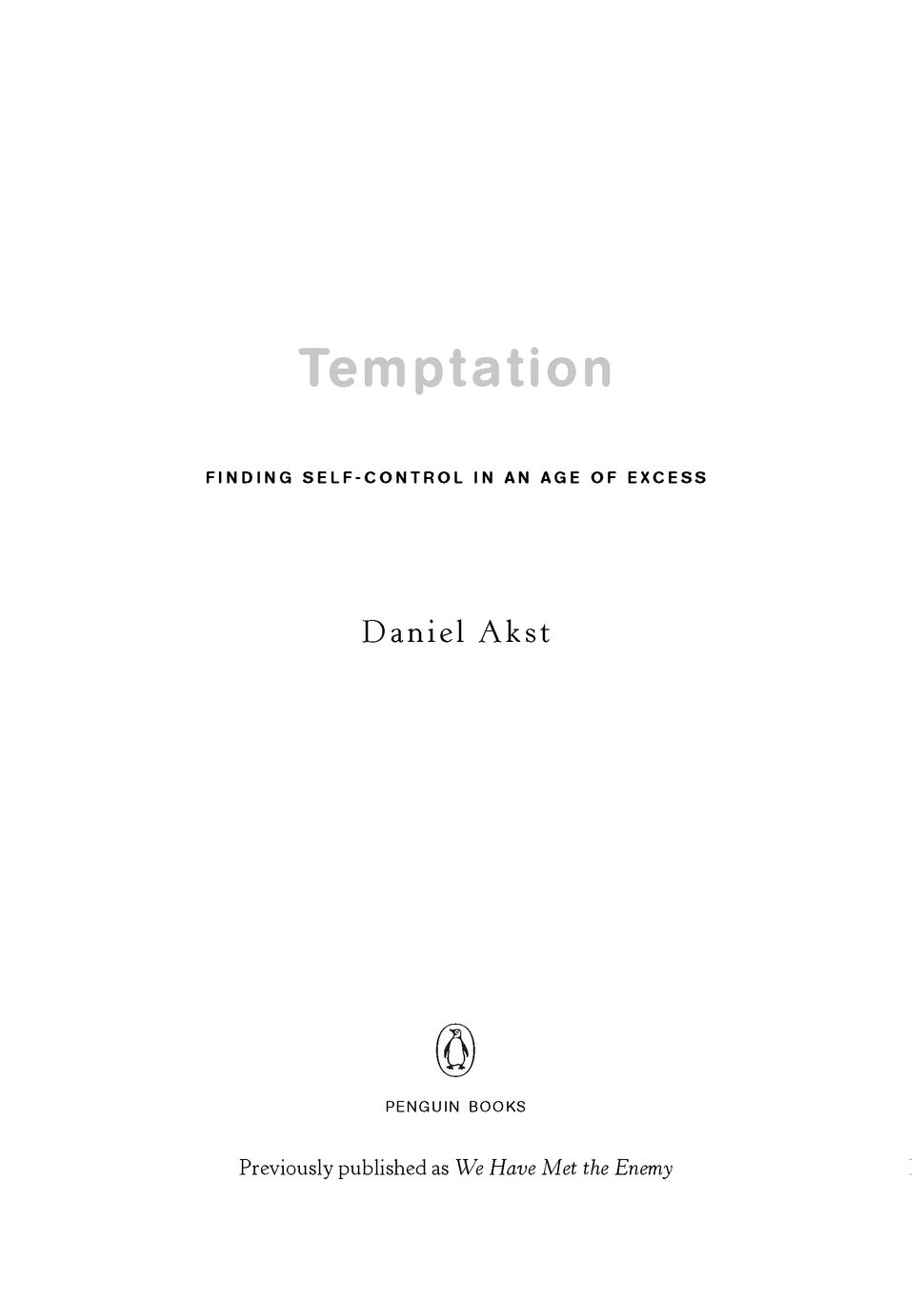Table of Contents
Praise for Temptation by Daniel Akst
Given how reluctant we are to ask tough questions about our behavior, Mr. Aksts approach is a helpful one, inviting a wide audience to think hard about a difficult problem and offering some ideas for solving it.
The Wall Street Journal
As Akst recognizes, arguments about the reality of personal autonomy have political resonances.... Willpower, Akst says, is like a muscle that can be strengthened but is susceptible to exhaustion.
George F. Will, The Washington Post
There is power in naming the problem, and this is part of what makes Aksts book good. He lays it all outall the many ways in which the modern matrix acts upon our psyches to our physical and emotional detriment. But the book is also good because it is positive, dedicated to seeking solutions.
The New Yorker Book Bench blog
As Americans have learned to embrace their desires and break away from stern Puritan traditions, the only thing left is to avoid killing ourselves with our newfound freedom.
Bloomberg Business Week
In a book full of startling facts, this might be the most startling: of the 2.5 million deaths in the U.S. annually, something approaching half could be prevented... if people simply managed to lead healthier lives.... It is this kind of willful self-destruction, Akst concludes, thats killing us in greater and greater numbers. A very thought-provoking and colorfully written book.
Booklist
You wouldnt be able to stop yourself from reading this book! Daniel Akst is among the sharpest, most perceptive writers of his generation, and he is in fine form in Temptation.
Gregg Easterbrook, author of Sonic Boom
This book entertains even as it pokes at our most sensitive spots. Daniel Akst handles the touchiest heretical ideas with charm, humor, and painless scholarship. With no ax to grind, no cause to serve but reason he opens up the foregone conclusions by which we live and leaves a reader with new and alternate views of ourselves and others. Like the finest essayists Akst makes the deepest ideas fascinating and fun to read.
Nicholas von Hoffman
The more a society progresses, the bigger a problem self-control turns out to be. If you wish to be ahead of the curve for understanding Americas problems, Dan Aksts excellent and informative book is the place to start.
Tyler Cowen, professor of economics at George Mason University and cocreator of The Marginal Revolution blog
PENGUIN BOOKS
TEMPTATION
Daniel Akst has written for the New York Times, the Wall Street Journal, the Los Angeles Times, and many other publications. His previous books include Wonder Boy, which chronicled the wondrous financial fraud he had a hand in exposing, and the novels St. Burls Obituary (a PEN/Faulkner finalist) and The Webster Chronicle. He lives with his wife and sons in New Yorks bucolic Hudson Valley, generally a good place to hide from temptation.
The life of every man is a diary in which he means to write one story, and writes another.
J. M. Barrie
Preface
For a writer in todays marketplace, moderation is an affliction. Theres something to be said for bourgeois respectability, of course, but nobody wants to read memoirs about heroic retirement saving, the Sturm und Drang of predawn carpooling, or the epic compromises that, strung together over the decades, produce an enduring marriage. All writers know this.
The tranquil current of domestic happiness affords no materials for narrative, Mary Brunton concluded two centuries ago in a didactic novel called Self-Control. The joys that spring from chastened affection, tempered desires, useful employment, and devout meditation, must be feltthey cannot be described. This is a truth universally acknowledged, which may be why Brunton has her heroine flee an evil boyfriend by tying herself to a birch-bark canoe and plunging over a Canadian waterfall. People made fun of that ending, but it sold books.
The same sort of thing sells nowadays, too, except its the writers hair-raising escape from his own demons that rings up the registers. A book about self-control today ought rightly to be about the authors struggles (however embroidered) to conquer some fiendish addiction. The problem is that, despite my best efforts, nobody could lead a more humdrum life than I do. Although I check my e-mail a little too often, I am not addicted to anything. I do not even struggle with my weight, exceptand this is embarrassingfor when it gets too low. Ive had my excesses over the years, but the sad fact is that I never quite manage to take them to excess. Nor does religious fervor move me to ecstasy or wrath. In general I am deaf to spirituality; the main thing I do religiously is maintain our cars. I will admit that in Las Vegas once, on assignment, I developed a gambling problem. The problem was that I lost $10 on the Penn-Dartmouth football game, the sting of which is with me still. Some years after this youthful binge I married my dentist, compared to whom I am the long-lost twin of Amy Winehouse raised by wolves.
Yet even I have self-control problems. Do you have any idea how long it took me to buckle down to work on the paragraphs you just read? First, of course, I had to explore the vast discography of the pianist Paul Bley via the Internet, that accursed underminer of all our best intentions. In doing so I naturally worked up quite an appetite, which meant time out for food, followed by a restorative nap. While working on this same section I also found time to add to my remarkable e-mail oeuvre, dispatching messages of unparalleled artistry and wit to correspondents the world over. (As it is for most writers these days, e-mail is by far the form in which I am most prolific.) I did some laundry, went to the gym, and took measurements for various household repairs that Im still putting off. I even kept a close eye on techbargains.com forwell, for some great tech bargains, the nature of which I havent yet imagined.
Now, during all this frantic self-distraction, I knew somewhere deep inside that sooner or later I really would have to write this prefaceand that the longer it took the less money and self-regard I would have. As time went by I grew anxious, and finally even furious. After a while I was practically desperate to get going. Yet somehow, for days on end, I failed to yoke my actions to what I could have sworn all along was my will, leaving the necessary work undone. The question is, how can such a thing possibly happen? Why, in other words, is self-control so difficult?
And why does it seem to be so much harder for some people than for others? Is it a matter of circumstances? Or maybe its a matter of just a single circumstancethe circumstance of birth, in which our ancestors perform the function of the Fates, investing our DNA with our destiny. What if even your garden-variety, mild-mannered, house-maintaining dad is programmed to someday run amok like the Manchurian Candidate or the Malaysian pengamoks who gave us the term?
This book is the result of my attempt to find some answers. In searching for them, I discovered all sorts of interesting thingsincluding the extent to which procrastination has been an enduring occupational hazard for writers. Victor Hugo, to cite a single example, supposedly ordered his valet to confiscate his clothes so he wouldnt go off and waste time doing somethinganything!other than writing. Even the prolific Irving Wallace, who cranked out commercial fiction the way Ben Bernanke cranks out greenbacks in a crisis, had to face this problem, which he addressed in an academic paper called Self-Control Techniques of Famous Novelists.


